A data privacy compliance lawyer specializes in advising organizations on how to comply with the complex web of data privacy laws and regulations.
These lawyers possess in-depth knowledge of laws like the GDPR (General Data Protection Regulation) in Europe, the CCPA (California Consumer Privacy Act) in the US, CIPA, VPPA< and other relevant legislation domestically and internationally.
A Compliance Lawyer and Data Privacy Lawyer Needs To Have expertise that extends to:
Data Protection Impact Assessments (DPIAs): Conducting and reviewing DPIAs to assess the risks associated with data processing activities.
Privacy Policies and Notices: Drafting, reviewing, and updating privacy policies and notices to ensure compliance with legal requirements.
Data Subject Rights: Advising on how to handle data subject requests, such as access, rectification, erasure, and data portability.
Cross-border Data Transfers: Assisting with the legal framework for transferring personal data across international borders.
Data Breach Response: Developing and implementing data breach response plans, including legal and regulatory reporting obligations.
Contractual Agreements: Drafting and reviewing data processing agreements (DPAs) with data processors and other third parties.
Staying abreast of evolving legal and regulatory changes: Continuously monitoring and adapting to new and amended data privacy laws.
By engaging a data privacy compliance lawyer, organizations can minimize legal risks, protect their reputation, and ensure they are operating in compliance with the ever-changing data privacy landscape.

Updated: 1-08-2025
In 2025, compliance attorneys must navigate an evolving landscape marked by technological advancements, regulatory changes, and global challenges. Staying ahead requires understanding and preparing for these significant shifts and the risks they entail. Here are some of the critical areas and potential risks that compliance attorneys need to be aware of:
Data Privacy and Protection Laws: With the continuous emergence of data privacy regulations globally (such as GDPR in Europe, CCPA in California, and others worldwide), compliance attorneys must stay informed about new and amended laws. They also need to understand the implications of cross-border data transfers and the risks of non-compliance, including substantial fines.
Cybersecurity Threats and Regulations: As cyber threats grow in sophistication, so do the regulations aimed at preventing them. Compliance attorneys should be vigilant about changes in cybersecurity laws and standards, ensuring their organizations are prepared to protect sensitive information and respond effectively to data breaches.
Artificial Intelligence and Machine Learning: The rapid deployment of AI and ML in various sectors raises questions about ethics, privacy, bias, and accountability. Attorneys will need to guide their organizations through the complex regulatory frameworks that govern these technologies, including emerging laws on automated decision-making and facial recognition.
Environmental, Social, and Governance (ESG) Compliance: ESG factors are increasingly important to investors, regulators, and consumers. Compliance attorneys should anticipate and adapt to new regulations and standards related to climate change, sustainability practices, social responsibility, and corporate governance.
Remote Work and Hybrid Work Models: The shift towards remote and hybrid work environments necessitates revising data protection policies, employee monitoring practices, and cybersecurity measures. Compliance attorneys must address the legal and regulatory implications of these work models, including data privacy concerns and labor law compliance.
Cryptocurrency and Blockchain Regulations: As the use of blockchain and cryptocurrencies expands, so does regulatory scrutiny. Compliance attorneys need to monitor legislative and regulatory developments affecting digital assets, smart contracts, and blockchain technology to manage associated risks.
International Trade and Sanctions: With geopolitical tensions affecting international trade, compliance attorneys must keep abreast of changes in trade laws, sanctions, and export controls. Navigating these complexities is crucial for organizations operating across borders.
Healthcare Compliance: For those in the healthcare sector, ongoing changes in healthcare laws, telehealth regulations, and patient data protection standards are areas of focus. The COVID-19 pandemic has also brought long-term changes to healthcare delivery and regulation.
Financial Regulations: Changes in financial regulations, including those related to fintech innovations, payment services, and anti-money laundering (AML) laws, continue to evolve. Staying informed about these changes is critical for compliance in the financial sector.
Compliance attorneys must not only monitor these developments but also proactively engage in strategic planning to mitigate risks and ensure organizational compliance. This involves continuous education, adopting technology solutions for compliance management, and fostering a culture of compliance within their organizations. More than ever, with the rise of new regulations for businesses of all sizes, it is important to have either a compliance attorney on staff or outsourced or in-house counsel to help with any regulatory issues as they arise. Compliance matters a lot. A single slip-on compliance can cause more than just financial damage. You could find yourself buried with severe fines, criminal charges, and even a sanction! Don’t fear, though… that’s where the role of skilled compliance lawyers comes shining through.
This legal professional ensures that businesses operate within the confines of regulatory laws, thereby fostering transparency, integrity, and trustworthiness.
Let’s learn more about compliance lawyers.
What is a Compliance Lawyer?
A compliance lawyer, often referred to as a corporate compliance attorney, is vital for businesses.
They ensure that all business operations comply with relevant laws and regulations, protecting the business from potential regulatory violations that could lead to severe penalties or damage to reputation.
To explain what a compliance lawyer is exactly, we have Chad D. Cummings, an Attorney at The Law Office of Chad D. Cummings. says:
“A competent compliance lawyer will not only assist clients to comply with the law but will also craft a proactive, holistic approach to ensure that an organization’s operational objectives comport with legal requirements, thereby potentially averting substantial fines and penalties.”
Compliance lawyers are crucial in navigating corporate compliance, including GDPR and CCPA standards, and handling sensitive personal information. They uphold businesses’ social contract with consumers, fostering a secure and lawful environment for engagement.
What Does a Compliance Lawyer Do?
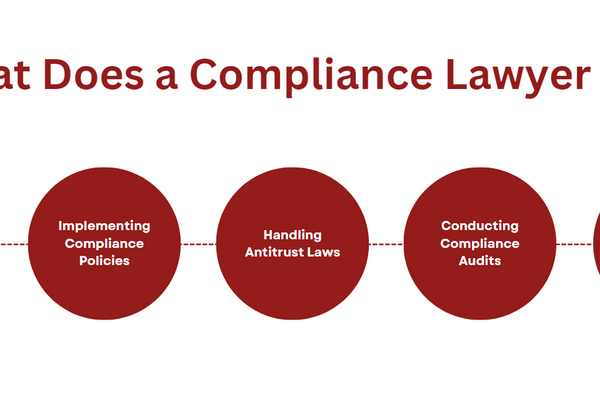
In business, a compliance lawyer fulfills numerous roles beyond interpretation of laws. These professionals are involved in the nitty-gritty of policy design, implementation, auditing, and continuous updating of compliance programs.
Their deep understanding of the law, coupled with an in-depth knowledge of industry-specific regulations, makes them essential in handling matters like antitrust laws.
Here’s what compliance lawyers do in a business:
Designing Accurate Compliance Policies
A compliance lawyer is key in creating accurate and efficient rules for a company. They develop these guidelines according to existing laws, making sure that businesses follow the required legal standards relevant to their field. This includes not only governmental measures (both state and federal), but also regulations set by bodies specific to different industries —and remember, all of this will continue changing over time.
Implementing Compliance Policies
Once the compliance policies are designed, the compliance lawyer steps in to ensure their effective implementation across the business. They work closely with different departments, educating and training them on the significance of these policies and the consequences of non-compliance.
Handling Antitrust Laws
Antitrust laws are designed to promote fair competition in the market, and a compliance lawyer has a critical role in interpreting and implementing these laws.
They ensure that businesses do not engage in practices that may harm competition, such as price fixing, monopolistic practices, or unfair trade.
Conducting Compliance Audits
An often overlooked aspect of a compliance lawyer’s job is conducting compliance audits.
These audits involve thorough checks to ensure that all policies and procedures align with relevant laws and regulations. The aim is to identify any areas of non-compliance and rectify them promptly to avoid regulatory penalties.
Designing Up-to-date Compliance Programs
The world of regulatory compliance is always moving, with laws and regulations often updated or modified. Compliance lawyers ensure that compliance programs remain up-to-date, adjusting them as necessary in line with changes to the law.
They continuously monitor regulatory developments, adjusting policies, and practices to ensure the business remains compliant.
Why Do Businesses Need Compliance Lawyers?
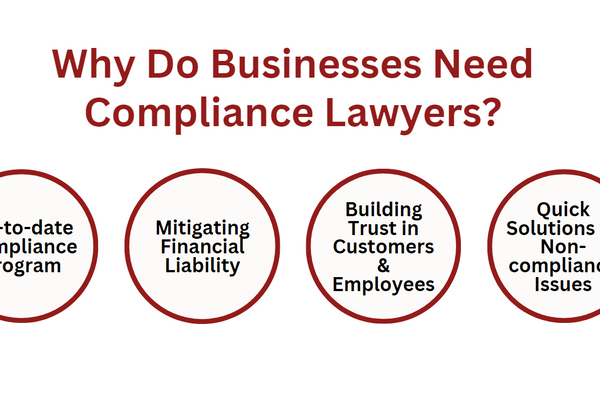
Given the complexity of business environments and the multitude of regulations and potential legal pitfalls, the value of compliance lawyers is vital. These professionals not only act as the business’s regulatory safeguard but also contribute to its overall integrity and success. Jerry Cutler, a university lecturer at Columbia and nationally acclaimed lawyer, says:
“Compliance lawyers are like an insurance policy for a business. They help identify potential risks and provide guidance on how to avoid them, thereby reducing the likelihood of adverse financial and reputational harm.”
From mitigating financial liability to maintaining up-to-date compliance programs and fostering trust among consumers and employees, a compliance lawyer is instrumental in several critical areas. Here’s why businesses need compliance lawyers:
Mitigating Financial Liability
First and foremost, a compliance lawyer helps businesses mitigate financial liability. Non-compliance with regulations often attracts substantial penalties and fines, which can strain a business’s financial resources.
A compliance lawyer helps prevent such situations by ensuring that all operations align with the relevant legal and regulatory framework.
Maintaining an Up-to-date Compliance Program
Laws and regulations are continually evolving. A compliance lawyer ensures that a business’s compliance program stays current with these changes.
By monitoring regulatory changes and updating policies and procedures accordingly, they help businesses avoid outdated practices that could lead to non-compliance.
Building Trust in Customers and Employees
Compliance lawyers also play a crucial role in building trust among consumers and employees. By ensuring that a business operates within the boundaries of the law and respects consumers’ rights, they enhance the business’s credibility and reputation.
This creates a trustful environment for consumers and boosts employee morale, knowing they work for an ethically sound and compliant business.
Quick Solutions to Non-compliance Issues
Despite preventive measures, instances of non-compliance can still occur. In such cases, a compliance lawyer swiftly identifies and addresses these issues. They help businesses rectify non-compliance issues promptly, minimizing potential damage and ensuring a swift return to compliant operations.
In a nutshell, a compliance lawyer serves as a lighthouse, guiding businesses safely through the stormy seas of regulations and compliance and anchoring them firmly in the harbor of success and credibility.
Want to hire an effective yet cost-effective compliance lawyer? Get in touch for a free consultation.
Sectors That Compliance Lawyers Work With
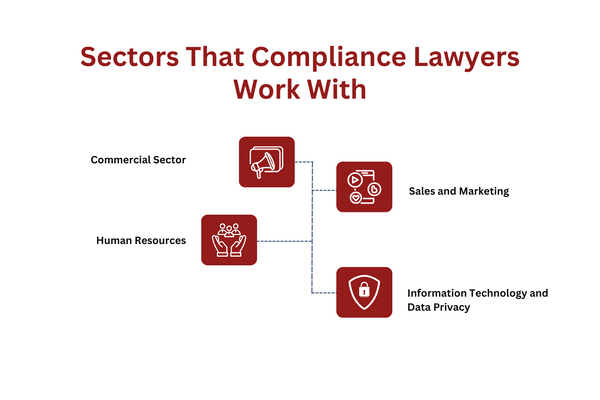
Compliance lawyers are versatile professionals who find their expertise in demand across a multitude of sectors. Their work isn’t confined to a specific area, as regulatory requirements pervade virtually all aspects of a business’s operations.
Here are some sectors where compliance lawyers make their mark:
Commercial Sector
In the commercial sector, compliance lawyers play an essential role in ensuring that all transactions and activities are conducted lawfully.
They help businesses navigate various commercial laws, including contract law, securities law, and intellectual property law, ensuring that the business is protected and operates within the legal framework.
Sales and Marketing
In the sales and marketing sphere, compliance lawyers ensure that advertising and promotional activities align with relevant advertising laws and regulations.
They advise on the appropriate language for marketing materials, help with the fine print in sales contracts, and ensure compliance with laws protecting consumer rights.
Human Resources
Human resources is another critical area where compliance lawyers are involved. They assist with compliance regarding labor laws, equal employment opportunity laws, benefits regulations, and other HR-related legal aspects.
They help create policies that protect both the business and its employees, fostering a fair and equitable work environment.
Information Technology and Data Privacy
In the age of digital transformation, compliance lawyers have a significant role to play in information technology and data privacy.
With regulations such as GDPR (Europe law) and CCPA (California, United States law) dictating the handling of sensitive personal information, compliance lawyers ensure that a business’s IT policies and practices adhere to these laws, safeguarding both the business and its consumers.
Is Compliance Lawyer A Good Career Path?
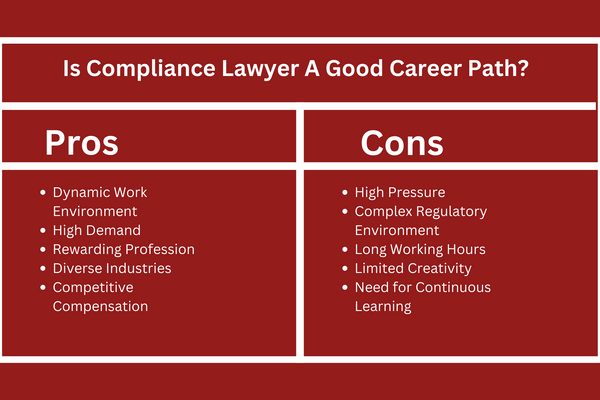
Choosing a career path, such as becoming a compliance lawyer, requires careful evaluation due to its unique rewards and challenges.
This profession demands a nuanced understanding of the law, a deep interest in regulatory affairs, and a commitment to safeguarding businesses against legal pitfalls.
Here are the pros and cons of pursuing a career as a compliance lawyer to help you make an informed decision.
Pros of Being a Compliance Lawyer
Dynamic Work Environment ‒ Compliance lawyers operate in a constantly changing legal landscape. This dynamic work environment presents opportunities for continuous learning and professional growth.
High Demand ‒ As regulations become more complex, businesses increasingly seek the expertise of compliance lawyers. This demand translates to excellent job prospects and job security.
Rewarding Profession ‒ Ensuring ethical business practices can be a rewarding career, both personally and professionally. Compliance lawyers contribute meaningfully to business integrity and consumer protection.
Diverse Industries ‒ Compliance lawyers aren’t confined to a particular sector. They have opportunities to work in diverse industries, allowing for broad professional exposure.
Competitive Compensation ‒ Given their specialized skill set and the high demand for their services, compliance lawyers can command competitive salaries and benefits.
Cons of Being a Compliance Lawyer
High Pressure ‒ The role of a compliance lawyer can be high-pressure. Mistakes in compliance can have severe implications for businesses, creating a stressful work environment.
Complex Regulatory Environment ‒ Compliance lawyers need to keep up with constantly changing laws and regulations. This requires continuous learning and adaptation, which can be challenging.
Long Working Hours ‒ Depending on the sector and the specific role, compliance lawyers might have to work long hours, particularly when dealing with audits or regulatory updates.
Limited Creativity ‒ While problem-solving is a big part of the job, the role may offer limited scope for creativity as it mostly involves interpreting and applying existing laws and regulations.
Need for Continuous Learning ‒ Laws and regulations evolve rapidly. As such, compliance lawyers must commit to ongoing professional development to stay current, which can be time-consuming.
How to be a Compliance Lawyer?
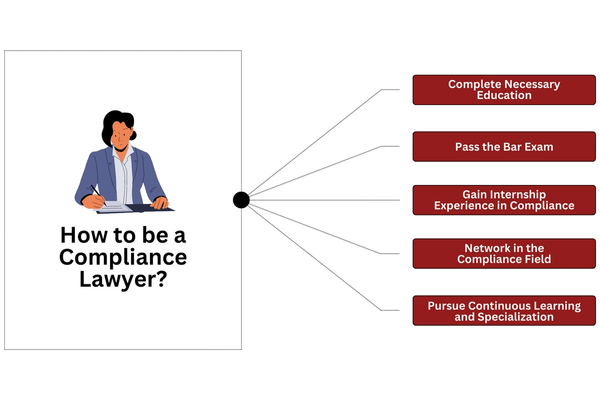
Embarking on a journey to become a compliance lawyer involves several critical steps, each playing a fundamental role in preparing for this challenging yet rewarding career.
Acquiring the right education, gaining practical experience, and building a professional network are crucial steps toward a successful career in compliance law. Here are the steps involved in becoming a compliance lawyer:
Complete Necessary Education
The first step towards becoming a compliance lawyer is obtaining a bachelor’s degree. While the field of study can vary, many aspiring compliance lawyers opt for pre-law, business, or a related field.
Following this, they need to attend law school and earn a Juris Doctor (JD) degree. Some law schools offer programs or courses specifically focused on corporate or regulatory compliance, providing students with a solid foundation in this area.
Pass the Bar Exam
After earning a JD degree, the next critical step is passing the bar exam. This comprehensive examination is a prerequisite for practicing law in a given jurisdiction.
It tests an individual’s understanding of various legal topics and their ability to apply this knowledge in practical situations.
Gain Internship Experience in Compliance
Real-world experience is invaluable in the field of compliance law. Gaining internship experience in a corporate compliance department or a law firm that specializes in regulatory compliance provides practical exposure to the realities of the job.
It’s also a great way to apply theoretical knowledge in a practical context and gain a deeper understanding of the profession.
Network in the Compliance Field
Building a strong professional network is crucial for aspiring compliance lawyers.
Joining professional associations, attending industry events, and participating in networking activities can open doors to job opportunities and provide exposure to different aspects of compliance law. Networking also helps in staying abreast of changes and trends in the field.
Pursue Continuous Learning and Specialization
Once established as a compliance lawyer, it’s important to pursue continuous learning. Laws and regulations are constantly evolving, and staying up-to-date is crucial.
Additionally, many compliance lawyers choose to specialize in a specific area of compliance law, such as GDPR or CCPA, further enhancing their expertise and career prospects.
FAQs
Does a Compliance Officer Need to be a Lawyer?
No, a compliance officer doesn’t necessarily need to be a lawyer. However, a legal background can be advantageous given the nature of the work, which involves understanding and applying complex laws and regulations.
Can a Compliance Lawyer Represent a Company in Court?
Yes, provided they are a licensed attorney, a compliance lawyer can represent a business in court. However, their primary role often involves preventing legal issues from reaching the courtroom in the first place.
What Skills Are Important for a Compliance Lawyer?
Compliance lawyers need excellent problem-solving skills, strong analytical abilities, good communication skills, and a solid understanding of business operations. They also need to be up-to-date with the latest laws and regulations relevant to their field of expertise.
How Does a Compliance Lawyer Differ from a Corporate Lawyer?
While both roles involve working with businesses, a corporate lawyer typically handles matters like mergers and acquisitions, corporate structure, and contracts, while a compliance lawyer focuses on ensuring that a business’s operations comply with relevant laws and regulations.
Is Transitioning from Lawyer to Compliance Officer Difficult?
Transitioning from a lawyer to a compliance officer is not typically difficult, especially if the lawyer has experience in areas relevant to compliance. In fact, many of the skills developed as a lawyer, such as analytical thinking and legal knowledge, are directly applicable to a compliance role.
What is the role of compliance counsel?
The primary role of the compliance counsel is to ensure the organization is compliant with relevant laws and policies. This often includes staying updated on the relevant laws and making any necessary changes when necessary.
How do legal and compliance work together?
Legal and compliance work together to ensure that a company is operating within the boundaries of laws, regulations, standards and ethical practices.
The legal department provides advice on the interpretation of these rules, while compliance ensures activities are conducted in accordance with this guidance.
This partnership not only helps prevent violations but also shields organizations from potential fines or penalties for non-compliance.
How Can Captain Compliance Help?
You may be wondering who your company’s compliance lawyer can be. We are the top choice for companies around the world for our top-of-the-line expertise in the compliance field.
Captain Compliance is committed to guiding you through all things compliance law. We can help businesses stay compliant with the necessary resources and support.
Captain Compliance is ready to assist. Get in touch today for a free consultation!